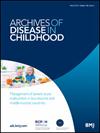Trends in sex differences in neurodevelopmental outcomes among extremely preterm infants
IF 3.9
2区 医学
Q1 PEDIATRICS
Archives of Disease in Childhood - Fetal and Neonatal Edition
Pub Date : 2024-09-17
DOI:10.1136/archdischild-2024-327239
引用次数: 0
Abstract
Objective To examine whether changes in survival without moderate or severe neurodevelopmental impairment (NDI) at 18–26 months’ corrected age from 1999 to 2018 differed between male and female infants. Design This retrospective cohort study used data from the NICHD Neonatal Research Network hospitals. Robust Poisson regression models were used to estimate adjusted relative risks (aRRs) and 95% CIs for survival without moderate or severe NDI between males and females. Interactions between sex and time were assessed to evaluate temporal differences in the outcome by sex. Variables adjusted for included centre, maternal age, ethnicity/race, gestational age and small for gestational age. Patients Inborn infants with gestational age of 22–26 weeks at NICHD Neonatal Research Network hospitals from 1999 to 2018. Main outcome measure Change over time in survival without moderate or severe NDI at 18–26 months’ corrected age between male and female infants. Results Of 26 307 infants, 13 045 (49.6%) were male. Survival without moderate or severe NDI declined for both sexes over time, from 32.9% to 30.6% for males and from 47.4% to 40.0% for females, between 1999–2003 and 2014–2018. Males were less likely than females to survive without moderate or severe NDI (aRR=0.80; 95% CI 0.78 to 0.83). Changes in survival without moderate or severe NDI did not differ between males and females. Conclusion There were no differential changes in survival without moderate or severe NDI between male and female infants. Data may be obtained from a third party and are not publicly available. Data reported in this paper may be requested through a data use agreement. Further details are available at极早产儿神经发育结果的性别差异趋势
目的 探讨 1999 年至 2018 年期间,在 18-26 个月矫正年龄时无中度或重度神经发育障碍 (NDI) 的存活率变化在男婴和女婴之间是否存在差异。设计 这项回顾性队列研究使用了来自美国国家儿童疾病防治中心(NICHD)新生儿研究网络医院的数据。采用稳健泊松回归模型估算男婴和女婴无中度或重度 NDI 存活率的调整相对风险 (aRR) 和 95% CI。评估了性别与时间之间的交互作用,以评价不同性别结果的时间差异。调整的变量包括中心、产妇年龄、民族/种族、胎龄和小胎龄。患者1999年至2018年期间在NICHD新生儿研究网络医院出生的胎龄为22-26周的新生儿。主要结局指标 男婴和女婴在 18-26 个月校正年龄时无中度或重度 NDI 的存活率随时间的变化。结果 在26 307名婴儿中,13 045名(49.6%)为男性。随着时间的推移,1999-2003 年至 2014-2018 年期间,男女婴儿无中度或重度 NDI 的存活率均有所下降,男婴从 32.9% 降至 30.6%,女婴从 47.4% 降至 40.0%。男性在无中度或重度 NDI 的情况下存活的可能性低于女性(aRR=0.80;95% CI 0.78 至 0.83)。无中度或重度 NDI 的存活率变化在男性和女性之间没有差异。结论 在无中度或重度 NDI 的情况下,男婴和女婴的存活率没有差异。数据可能来自第三方,不对外公开。本文中报告的数据可通过数据使用协议索取。更多详情请访问 。
本文章由计算机程序翻译,如有差异,请以英文原文为准。
求助全文
约1分钟内获得全文
求助全文
来源期刊
CiteScore
9.00
自引率
4.50%
发文量
90
审稿时长
6-12 weeks
期刊介绍:
Archives of Disease in Childhood is an international peer review journal that aims to keep paediatricians and others up to date with advances in the diagnosis and treatment of childhood diseases as well as advocacy issues such as child protection. It focuses on all aspects of child health and disease from the perinatal period (in the Fetal and Neonatal edition) through to adolescence. ADC includes original research reports, commentaries, reviews of clinical and policy issues, and evidence reports. Areas covered include: community child health, public health, epidemiology, acute paediatrics, advocacy, and ethics.

 求助内容:
求助内容: 应助结果提醒方式:
应助结果提醒方式:


